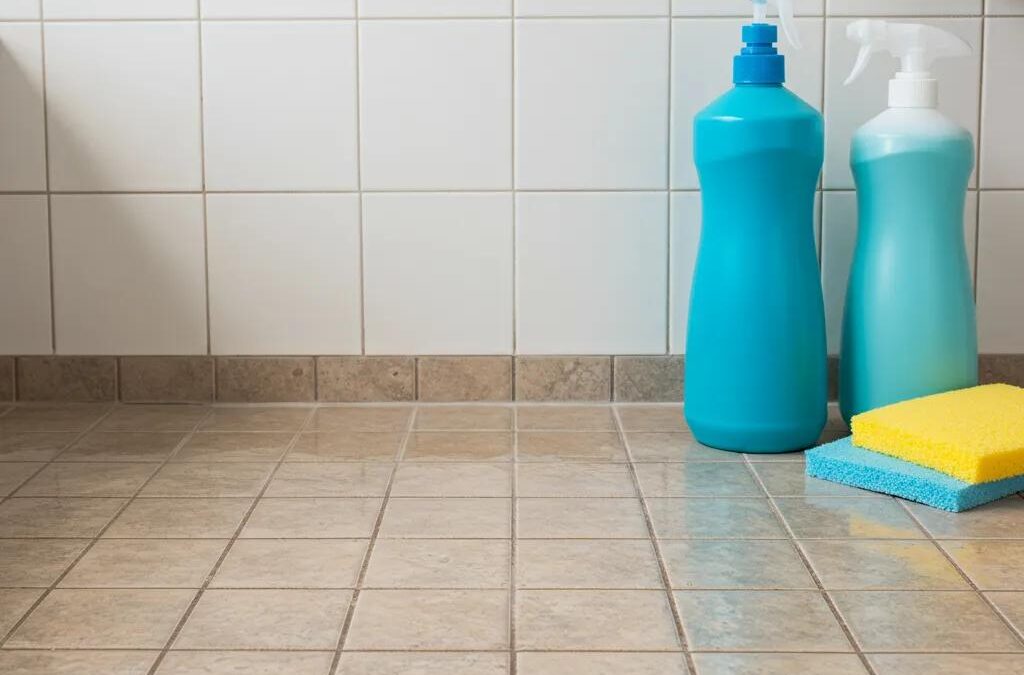Grout discoloration can make otherwise well-kept tile look aged, stained, and unhygienic; understanding causes and professional prevention restores appearance and protects long-term value. This guide explains why grout darkens, practical daily and seasonal prevention, and when to call local grout cleaning professionals for deep remediation and sealing. Elevate Flood Restoration and Carpet Cleaning offers tile and grout cleaning across Eastern Idaho with eco-friendly products and professional-grade equipment, bringing local expertise to Idaho Falls, Ammon, Rigby, Shelley, Pocatello, and Rexburg. Read on to learn cause-and-effect mechanics of grout staining, step-by-step professional cleaning and sealing methods, the benefits of hiring local technicians, how sealing protects grout, where Elevate serves near familiar landmarks, and straightforward pricing drivers so you can request a free estimate confidently. Throughout, you’ll find actionable prevention steps, safe DIY guidance by tile type, and clear comparisons of cleaning and sealer options tailored to local conditions and family-safe households.
What Causes Grout Discoloration and How Can It Be Prevented?
Grout discoloration occurs when porous grout lines absorb dirt, oils, organic residues, and moisture that promote staining and microbial growth; prevention works by blocking absorption, removing soils before they penetrate, and controlling humidity. Addressing the root mechanisms—capillary action, microbial nutrient sources, and abrasive wear—lets homeowners prioritize the most effective maintenance steps. This section defines common causes, explains how routine cleaning helps, why professional sealing matters, and what safe DIY actions reduce long-term staining risk. Follow-through with scheduled cleaning and appropriate sealers reduces discoloration frequency and preserves grout appearance between professional services.
What Are the Main Causes of Grout Discoloration?
Grout is porous and acts like a sponge for dirt, grease, soap scum, and spilled liquids, which embed and darken the grout matrix over time. Moist environments such as showers and mudrooms encourage mold and mildew that produce visible staining and organic discoloration, while hard wear and abrasive soils erode grout surface texture and change color. Chemical damage from acidic or overly harsh cleaners can etch grout or strip previous sealers, leaving uneven coloration and greater susceptibility to new stains. Understanding these mechanisms clarifies why both prevention and correct cleaning chemistry are essential to maintain grout integrity.
How Does Regular Cleaning Help Prevent Grout Stains?
Regular cleaning removes surface soils before they penetrate grout pores and stop organic residues from becoming a food source for microbes that cause discoloration. Weekly light cleaning with pH-neutral detergents prevents soap scum buildup in bathrooms and grease accumulation in kitchens, and monthly targeted cleaning helps avoid deep-set stains that require professional extraction. Professional maintenance every 1–2 years or when stains persist ensures embedded soils are extracted and previous sealers are re-evaluated. Establishing a consistent routine dramatically reduces the frequency of deep restoration and prolongs the life of both grout and tile.
Why Is Professional Grout Sealing Essential for Long-Term Protection?
Professional grout sealers penetrate or coat grout to block capillary absorption of liquids and soils; by reducing permeability they lower stain occurrence and microbial colonization. Proper application by trained technicians ensures adequate penetration depth, correct product selection for grout porosity and tile type, and proper cure time to deliver predictable longevity. Sealing also reduces cleaning labor: sealed grout repels spills and allows routine cleaners to lift soils more easily, which prevents discoloration from developing. For best outcomes, sealing should be part of a planned maintenance cycle after deep cleaning to lock in protection.
What DIY Methods Can Help Prevent Grout Discoloration?
Safe DIY methods include regular sweeping and damp-mopping with pH-neutral cleaners, prompt blotting of spills, and occasional oxygenated-bleach treatments for light organic stains on ceramic and porcelain. Avoid acidic cleaners like vinegar on natural stone and certain grout formulations because acids can etch surfaces and degrade existing sealer layers, increasing discoloration risk. For mild spot-cleaning, a paste of oxygenated bleach and water left to dwell briefly and rinsed thoroughly can lift surface stains without harsh chemicals. When stains persist after safe DIY steps, it’s time to consult professionals to prevent damage from over-aggressive home remedies.
How Does Elevate’s Professional Tile and Grout Cleaning Process Work?
Elevate’s professional process begins with a detailed inspection to determine tile and grout type, soil level, and any existing sealers or damage before tailoring a cleaning plan. Technicians use eco-friendly pre-treatments and mechanical agitation combined with professional hot water extraction or oxygenated cleaners to dislodge embedded soils without harming tile surfaces. After deep extraction, technicians offer grout sealing options selected for the grout porosity and household needs, followed by a post-cleaning inspection and customer walkthrough to confirm satisfaction. The controlled sequence—inspect, pre-treat, clean, extract, seal, inspect—delivers predictable restoration, reduced re-soiling, and longer-lasting grout appearance.
What Are the Steps in Elevate’s Deep Grout Cleaning Method?
Elevate follows a clear, repeatable sequence that maximizes soil removal while protecting tile: inspection, pre-treatment, mechanical agitation, extraction, optional sealing, and final quality check. The initial assessment identifies tile type and grout condition to select the safest chemistry, then pre-treatment breaks down grease and organic residues to improve extraction efficiency. Mechanical agitation—using brushes or rotary tools—loosens embedded soils while hot water extraction or high-efficiency vacuum systems flush and remove contaminants. Final sealing, when chosen, is applied after full drying to ensure sealer penetration and long-term protection, and a technician completes a visual and tactile inspection with photographic documentation.
How Do Eco-Friendly Products Enhance Grout Cleaning Safety?
Eco-friendly cleaning solutions reduce volatile fumes and lower toxicity risks for households with children, pets, or chemical sensitivities while remaining effective when paired with professional equipment and agitation. These formulations focus on oxygen-based oxidizers, biodegradable surfactants, and enzyme-boosted cleaners that target organic soils and odors without corrosive acids or harsh alkalies. The trade-off can be slightly longer dwell times or increased mechanical action compared with aggressive chemistries, but the safety and indoor air quality benefits often outweigh the time difference. Choosing low-toxicity products supports routine maintenance and post-service indoor comfort without compromising cleaning outcomes.
What Role Does Odor Neutralization Play in Grout Cleaning?
Odor neutralization targets the underlying organic residues and microbial byproducts embedded within grout rather than masking smells with fragrances, which ensures lasting freshness after cleaning. Professionals use enzymatic or neutralizing agents to break down odor-causing compounds and then remove these residues through extraction, preventing rapid odor return. Proper ventilation and thorough drying after cleaning eliminate moist microclimates where microbes proliferate, completing the odor control strategy. Customers benefit from both visual improvement and improved indoor air quality when odor neutralization is integrated into grout restoration.
How Is Post-Cleaning Inspection Conducted to Ensure Quality?
Post-cleaning inspection involves a standardized checklist that assesses grout color uniformity, residual cleaning solution, sealer adhesion, and overall surface condition, documented through before-and-after photos for transparency. Technicians perform tactile checks to ensure no gritty residues remain and confirm that sealer cured according to product specifications, noting any areas needing touch-up or additional treatment. A customer walkthrough explains maintenance recommendations, expected cure timelines for sealers, and schedules for future cleaning or resealing. This final verification step reduces rework and aligns expectations between the homeowner and the service provider.
Different professional cleaning approaches suit different tile types and soil conditions; the table below compares common methods so you can understand trade-offs when evaluating service options.
| Cleaning Method | Mechanism | Suitable Tile Types |
|---|---|---|
| Hot Water Extraction | High-pressure hot water + suction removes loosened soils | Ceramic, porcelain, sealed natural stone |
| Steam Cleaning | High-temperature steam softens residues for extraction | Porcelain, some ceramics; avoid on unsealed natural stone |
| Oxygenated Cleaners | Oxidizing agents break organic stains safely | Ceramic, porcelain, many grout types; safe for most sealed surfaces |
What Are the Benefits of Hiring Local Grout Cleaning Professionals in Eastern Idaho?
Hiring local grout cleaning professionals delivers faster response, familiarity with regional soils and humidity effects, and tailored advice that fits community needs across Idaho Falls and nearby towns. Local technicians understand seasonal moisture patterns and common household traffic pathways that drive grout wear, enabling calibrated maintenance schedules and product choices. Professional cleaning improves indoor air quality by removing allergen reservoirs and microbial growth embedded in grout, and routine service extends tile lifespan through proper extraction and sealing. Choosing a community-focused provider also enhances accountability and follow-up support for ongoing maintenance and satisfaction.
How Does Professional Cleaning Improve Indoor Air Quality and Hygiene?
Professional grout cleaning removes porous reservoirs of dust, pollen, mold spores, and bacteria that can accumulate in grout lines and release allergens into living spaces over time. Deep extraction and odor-neutralizing treatments reduce both visible staining and the microscopic allergen load that aggravates respiratory conditions for sensitive occupants. Improved drying and sealing prevent recurrent microbial growth, creating a surface that is easier to maintain with routine cleaning and less likely to harbor irritants. The combined effect is a measurable improvement in surface hygiene and perceived indoor air cleanliness after professional restoration.
How Can Professional Services Extend the Life of Your Tile and Grout?
By removing abrasive trapped soils and restoring grout porosity before sealing, professional services reduce the mechanical wear that accelerates grout erosion and tile edge damage. Sealing prevents moisture intrusion that leads to freeze-thaw cycles in cooler months and slows staining that otherwise necessitates grout repair or replacement. Regular professional maintenance offers preventive care that is less expensive over time than partial regrouting or tile replacement, representing a clear return on investment for well-used areas. Documented service and condition records also help homeowners plan budgets and avoid sudden, large repair expenses.
Why Choose a Family-Owned Business Like Elevate in Idaho Falls and Nearby Cities?
A family-owned provider often emphasizes personalized scheduling, responsive communication, and locally tailored solutions that larger chains may not prioritize, creating stronger customer relationships. In Eastern Idaho, community ties enable quicker coordination near landmarks and neighborhoods, and technicians who live locally bring practical knowledge about area-specific soils and seasonal effects. Elevate Flood Restoration and Carpet Cleaning highlights this local commitment, using eco-friendly products and professional-grade equipment to deliver service that balances safety, efficacy, and community care. That local accountability supports consistent follow-up and satisfaction processes that protect your investment.
What Customer Satisfaction Guarantees Does Elevate Offer?
Elevate positions customer satisfaction as a central promise by offering follow-up remedies and documented quality checks to address any remaining concerns after service completion. A clear guarantee process reduces buyer risk by defining steps for remediation, such as targeted touch-ups or re-treatment when results fall short of agreed expectations. Transparent communication during inspection, documentation of conditions, and a final walkthrough keep customers informed and aligned with recommended maintenance. This approach builds trust by ensuring technicians stand behind their work and provide actionable next steps if additional attention is required.
- Key benefits of hiring local professionals include:
- Faster scheduling and localized expertise.
- Improved indoor air quality through deep extraction.
- Extended tile and grout lifespan via sealing and maintenance.
How Does Grout Sealing Protect Against Future Discoloration and Damage?
Grout sealing creates a barrier that reduces liquid and soil absorption, limiting stain formation and microbial colonization that produce discoloration; the right sealer selection and application determine longevity and maintenance ease. Sealers work by penetrating grout pores or forming thin surface films that repel contaminants, and professional application ensures appropriate penetration and curing. Sealing significantly reduces cleaning frequency and helps maintain uniform grout color, while periodic reapplication keeps protection current against local traffic and moisture challenges. Choosing between penetrating, topical, or hybrid sealers depends on tile type, use patterns, and aesthetic goals.
What Types of Grout Sealers Are Available and Which Is Best?
Sealers generally fall into penetrating (invisible repellents), topical (surface films), and silane-siloxane hybrid categories that combine properties for durability and water repellency. Penetrating sealers are best for natural stone and porous grout because they maintain natural appearance while reducing absorption, whereas topical sealers are useful where high-gloss or heavy-duty surface protection is desired. Hybrid silane-siloxane products provide balanced water and oil repellency for busy kitchens or entryways. Choice hinges on grout porosity, expected traffic, and whether the homeowner prefers an invisible finish or a sheen that enhances tile appearance.
How Long Does Grout Sealant Last and When Should It Be Reapplied?
Typical grout sealer lifespan ranges from about one to three years depending on sealer type, traffic intensity, and local humidity; heavy-use areas or damp environments may need earlier reapplication. Visual tests—such as a water drop test to see if water beads or soaks into grout—help determine when resealing is required, while noticeable darkening or rapid staining indicates compromised protection. Scheduling periodic inspections and planning resealing after professional deep cleaning ensures consistent protection and prevents accumulation of stubborn stains. Local conditions in Eastern Idaho, like seasonal moisture changes, can shorten expected longevity, so adapt intervals accordingly.
How Does Grout Sealing Prevent Mold, Stains, and Dirt Absorption?
Sealers reduce capillary action that pulls liquids and dissolved soils into grout, lowering available nutrients and moisture that enable mold and mildew growth, which in turn prevents many common stains. By minimizing absorption, sealers make routine cleaning more effective because soils remain surface-bound and are easier to remove without aggressive cleaners. Reduced moisture penetration also curbs freeze-thaw or substrate-related issues that can exacerbate discoloration over time. Overall, sealing is a proactive defense that simplifies maintenance and reduces the likelihood of costly restoration.
| Sealer Type | Best For | Longevity |
|---|---|---|
| Penetrating Sealer | Porous grout, natural stone | 1–3 years |
| Topical Sealer | High-gloss needs, heavy traffic | 6–12 months |
| Silane-Siloxane Hybrid | Exterior or high-moisture areas | 2–3 years |
Which Areas Does Elevate Serve for Tile and Grout Cleaning in Eastern Idaho?
Elevate Flood Restoration and Carpet Cleaning serves Idaho Falls and surrounding Eastern Idaho communities including Ammon, Rigby, Shelley, Pocatello, and Rexburg, applying local knowledge to scheduling and product selection for each area. The company emphasizes family-owned service values, eco-friendly cleaning formulations, and professional-grade equipment to restore grout lines and apply sealers tailored to local traffic and humidity patterns. Mentioning familiar landmarks helps homeowners identify service reach and approximate response considerations when requesting an estimate. Customers in these cities can expect personalized scheduling and local responsiveness that a community-based provider offers.
What Are the Key Landmarks Near Idaho Falls for Grout Cleaning Services?
Local landmarks anchor service awareness and can help estimate travel time and technician familiarity with neighborhoods and commercial districts surrounding Idaho Falls. Landmarks provide practical reference points for scheduling and help technicians anticipate common soil types and usage patterns near schools, parks, and commercial corridors. Familiarity with these community features supports efficient routing and resource planning for multi-job days, which can translate into better pricing and faster response. Identifying a nearby landmark when requesting service helps the provider prioritize logistics for same-week appointments.
How Does Elevate Serve Ammon, Rigby, Shelley, Pocatello, and Rexburg?
Elevate adapts scheduling and resource allocation based on each city’s proximity to Idaho Falls, grouping nearby jobs to optimize travel and reduce potential fees for outlying locations. In-town service areas typically receive faster appointment windows, while surrounding towns are scheduled with efficient routing to keep costs transparent and predictable. Technicians bring professional equipment and family-friendly cleaning chemistries to each visit, ensuring consistent quality across the service area. Local clients can request area-specific references and scheduling notes during the estimate process.
How Can Customers Request Service or a Free Estimate in These Locations?
When preparing for an estimate, customers should gather basic details such as approximate square footage of tiled areas, tile and grout type if known, photos of problem areas, and any recent cleaning history to speed accurate quoting. A concise checklist improves estimate accuracy and shortens response time, and providers often offer photo-based preliminary estimates followed by on-site verification for final pricing. Typical response windows reflect local demand and routing; customers are encouraged to request free estimates and mention any urgent discoloration or safety concerns. Clear preparation helps both homeowners and technicians arrive with the right expectations and tools.
- Information to have ready for a free estimate:
- Approximate square footage of tile/grout area.
- Photos of stained or high-traffic sections.
- Tile and grout type (if known) and recent cleaning history.
What Is the Typical Cost of Professional Tile and Grout Cleaning in Idaho Falls and Surrounding Areas?
Pricing for grout cleaning varies with square footage, grout condition, tile type, travel, and optional sealing; understanding these drivers helps homeowners evaluate quotes and plan budgets. Transparent providers itemize labor, materials, and optional services such as sealers or odor-neutralization so customers can compare offers fairly. Free preliminary estimates—often photo-based—give a baseline, while on-site inspections produce definitive quotes that reflect localized factors like heavy soiling or restoration needs. When evaluating value, weigh the long-term protection of sealing and the deeper cleaning outcomes that reduce repeat treatments.
What Factors Influence the Cost of Grout Cleaning Services?
Several factors drive price: total square footage and layout complexity, soil severity and the need for restorative techniques, tile and grout material that influence chemistry and dwell time, and whether sealing or repairs are included. Travel time from the service hub and scheduling complexity for multi-room jobs also affect labor estimates, as does the requirement for specialized equipment or containment for heavy remediation. The need for odor neutralization, antimicrobial treatments, or post-cleaning sealing adds to material costs but can prevent costly rework. Understanding these elements clarifies why quotes vary and which choices control final price.
How Does Elevate Provide Transparent Pricing Without Hidden Fees?
Elevate emphasizes itemized estimates that separate base cleaning labor from optional services such as sealing or antimicrobial treatments, and technicians discuss trade-offs so customers can choose desired outcomes. Clear communication during inspection documents recommended actions, expected timelines, and any follow-up needs, which reduces surprises after service completion. Photo-based preliminary quotes followed by on-site verification help match customer expectations to final pricing, and explained reapplication timelines for sealers guide budgeting. This transparency supports trust and informed decision-making for homeowners.
How Can Customers Get a Free Estimate for Their Tile and Grout Cleaning Needs?
To obtain a free estimate, prepare area size, photos of problem spots, tile and grout type if known, and notes about traffic patterns or pets/children that affect product choice; submitting these details speeds initial assessment. Providers typically respond with a preliminary estimate and suggest an on-site inspection for precise pricing where needed, explaining optional services like sealing or odor neutralization. Expect clear timelines for estimate responses and an itemized breakdown during the follow-up visit so you can approve or modify the scope. Prepared customers receive closer-to-final quotes and can schedule service sooner.
| Cost Component | How It Affects Price | Example Impact |
|---|---|---|
| Labor (sq ft) | Larger areas increase labor hours | Primary cost driver |
| Materials & Sealers | Higher-spec sealers increase materials cost | Adds per-room fee |
| Tile Condition | Heavy restoration needs increase time | May double labor |
| Travel/Logistics | Distant locations add travel time | May add surcharge |
What Are the Most Frequently Asked Questions About Local Grout Cleaning and Discoloration Prevention?
This FAQ compilation answers common homeowner questions about cleaning frequency, safe household products, mold causes and treatment, cost-effectiveness of professional services, and how landmarks affect scheduling and fees. Each answer gives practical guidance and helps readers decide when to attempt DIY maintenance and when to call professionals for deeper remediation. The responses are concise and designed for quick reference to support scheduling, budgeting, and safe cleaning practices in Eastern Idaho homes.
How Often Should You Professionally Clean and Seal Your Grout?
As a baseline, professional deep cleaning every 1–2 years and resealing every 1–3 years suits many homes, with adjustments for heavy traffic areas or damp environments that require more frequent attention. High-moisture bathrooms or entryways with tracked-in soils may need annual cleaning and sealing, while low-traffic rooms can extend intervals accordingly. Visual cues—persistent darkening, rapid re-soiling, or water absorption during a bead test—signal the need for earlier professional attention. Regular light maintenance at home helps stretch the interval between professional services.
Can You Use Common Household Products Like OxiClean or Vinegar Safely on Grout?
Oxygen-based cleaners like OxiClean are generally safe for many ceramic and porcelain tiles when used per directions and rinsed thoroughly, but acidic solutions such as vinegar should be avoided on natural stone and some grout types because they can etch surfaces and degrade sealers. Always test a small inconspicuous area first and use pH-neutral detergents for routine cleaning to protect grout integrity. When in doubt, consult a professional to avoid irreversible damage from common home remedies. Proper product choice reduces discoloration risk and preserves prior sealing.
What Causes Mold Growth in Grout and How Is It Treated?
Mold in grout results from persistent moisture, poor ventilation, and organic residues that serve as nutrients; treatment combines cleaning to remove mold, drying to eliminate moisture, and sealing to prevent recurrence. Professionals distinguish between surface mold that responds to cleaning and deeper microbial colonization that may require antimicrobial treatments and moisture remediation. Post-treatment ventilation and addressing the moisture source are critical to prevent rapid regrowth. Early action avoids structural damage and reduces health risks associated with mold exposure.
Is Professional Grout Cleaning Worth the Investment Compared to DIY?
Professional cleaning delivers deeper extraction of embedded soils, preserves grout integrity, and pairs cleaning with sealing options that reduce future maintenance—advantages that often outweigh DIY costs for high-value areas or persistent stains. Professionals use calibrated chemistries and mechanical extraction systems that remove soils DIY methods often leave behind, and documented sealing extends longevity to lower lifecycle costs. For routine light maintenance, DIY is cost-effective, but when stains persist or grout has not been sealed, professional service is a prudent investment. The ROI shows in reduced cleaning frequency and delayed costly repairs.
How Do Local Landmarks Influence Service Availability and Response Times?
Proximity to service hubs and landmarks affects scheduling, with closer jobs typically receiving quicker appointment windows and lower travel-related fees, while outlying properties may be coordinated into efficient routing to minimize cost. Grouping nearby jobs on a single day helps reduce travel charges and can enable special scheduling options for neighborhoods. Mentioning a nearby landmark when requesting service helps the provider estimate travel time and plan routes, improving appointment accuracy. Clear geographic context speeds logistics and creates predictable service expectations.
- Common proactive steps: Regular cleaning, prompt spill management, and scheduled professional maintenance.
- When to call pros: Persistent stains, visible mold, or when the wrong DIY chemistry has been used.
- Preparation for estimates: Photos, square footage, tile type, and traffic notes accelerate accurate quotes.
These concise answers help homeowners choose safe practices and decide when professional intervention delivers the best long-term value.
- Related services homeowners commonly combine with grout cleaning:
- Carpet cleaning for adjoining areas.
- Upholstery cleaning to remove tracked soils.
- Flood restoration for water-damage scenarios.
Mentioning these sibling services helps homeowners plan comprehensive cleaning or restoration projects that address interconnected indoor-soil and moisture challenges.
Conclusion
Maintaining clean grout is essential for preserving the aesthetic and hygiene of your tiled surfaces, preventing discoloration and microbial growth. By investing in professional grout cleaning and sealing, homeowners can enjoy long-lasting results that enhance indoor air quality and extend the lifespan of their tiles. Elevate Flood Restoration and Carpet Cleaning offers tailored services that cater to the unique needs of Eastern Idaho residents. Contact us today to schedule your free estimate and experience the difference of professional care.






